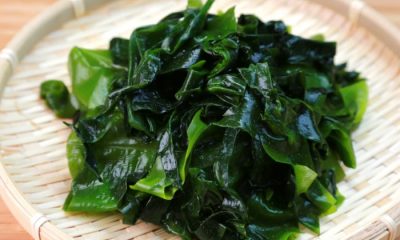Health
Side effects of drinking apple cider vinegar

The Side effects of Apple Cider vinegar is what we are detailly going to focus on.
Apple cider vinegar is known to be a natural tonic. It has many health benefits, this has been confirmed by many scientific studies.
However, several specialists have also expressed their concerns about their dangerousness and its possible side effects.
This article informs you about the side effects and potential dangers of apple cider vinegar but it also gives you some recommendations for consuming apple cider vinegar safely.
If your favourite supermarket does not offer this economical product you can easily get it by following this link
What is apple cider vinegar?
Apple cider vinegar is made by simply combining apples with yeast.
The yeast then turns the sugar in the apples into alcohol.
Bacteria are then added to the mixture, which ferments the alcohol into acetic acid.
Acetic acid makes up about 5-6% of apple cider vinegar. It is classified as a “weak acid”, but still has fairly strong acidic properties when concentrated.
In addition to acetic acid, vinegar contains water and traces of other acids, vitamins and minerals.
Several studies on animals and on humans have shown that acetic acid and apple cider vinegar can promote fat burning and therefore weight loss, lower blood sugar, increase insulin sensitivity and improve the cholesterol levels.
Unfortunately, apple cider vinegar can cause side effects, especially when consumed in large doses.
1. Delays stomach emptying
Apple cider vinegar helps prevent blood sugar spikes by reducing the rate at which food leaves the stomach and enters the lower digestive tract.
This slows down its absorption into the bloodstream.
However, this effect can worsen the symptoms of gastroparesis, a common condition in people with type 1 diabetes.
In gastroparesis, the nerves in the stomach do not work properly, so food stays in the stomach for too long and is not released at a normal rate.
Symptoms of gastroparesis include heartburn, bloating, and nausea.
For type 1 diabetics with gastroparesis, it is very difficult to predict when insulin will be given with meals, as it is difficult to predict how long it will take for food to be digested and absorbed.
A controlled study involved 10 patients with type 1 diabetes and gastroparesis.
Drinking water with 2 tablespoons (30 ml) of apple cider vinegar significantly increased the length of time food remained in the stomach.
2. Digestive disorders
Apple cider vinegar can cause unpleasant digestive symptoms in some people.
Studies in humans and animals have shown that apple cider vinegar and acetic acid can decrease appetite and promote feelings of fullness, leading to a natural reduction in calorie intake.
However, a controlled study suggests that in some cases appetite and food intake may decrease due to a feeling of indigestion.
People who consumed a drink containing 25 grams of apple cider vinegar reported a loss of appetite as well as significantly more nausea sensations, especially when the vinegar was part of an unpleasant tasting drink.
Potassium deficiency and bone loss
There are no controlled studies on the effects of apple cider vinegar on blood potassium levels and bone health.
Recently, a case of potassium deficiency and bone loss was attributed to high doses of apple cider vinegar that had been consumed over a long period of time.
A 28-year-old woman consumed 250 ml of apple cider vinegar diluted in water daily for six years.
She was eventually admitted to the hospital with very low potassium and other abnormalities in blood chemistry.
This woman was also diagnosed with osteoporosis, a disease of fragile bones that are rarely seen in young people.
Doctors who treated the woman assume that the high daily doses of apple cider vinegar caused a decrease in minerals in her bones and those to regulate the acidity of her blood.
They also noted that high levels of acid can reduce the formation of new bone.
Of course, the amount of apple cider vinegar, in this case, was much more than what most people usually consume in a single day.
3. Skin burns
Due to its strong acidic nature, apple cider vinegar can also cause burns when applied to the skin.
In one case, a 14-year-old girl developed lesions on her nose after applying several drops of apple cider vinegar to remove two moles, according to a protocol she had seen on the internet.
In another case, a 6-year-old boy with multiple health issues developed burns to his legs after his mother treated his leg infection with apple cider vinegar.
4. Erosion of tooth enamel
Acidic foods and drinks have been shown to damage tooth enamel.
Soft drinks and fruit juices have been more widely studied, but some research shows that the acetic acid in vinegar can also damage tooth enamel.
In a laboratory study, the enamel of wisdom teeth was immersed in different vinegars that ranged in pH from 2.7 to 3.95.
The kinds of vinegar caused a loss of minerals of 1 to 20% of the teeth after four hours.
It’s important to note that this study was done in the lab and not in the mouth, where saliva helps regulate acidity.
Nevertheless, there is some evidence that large amounts of vinegar can cause dental erosion.
One study also concluded that a 15-year-old girl’s severe tooth decay was caused by consuming one cup (237 ml) of undiluted apple cider vinegar per day for several weeks.
The girl was on a drastic diet to lose weight quickly.
5. Burns in the throat
Apple cider vinegar can cause burns to the oesophagus (throat).
A review of harmful fluids accidentally swallowed by children revealed that the acetic acid in vinegar was the most common acid that caused throat burns.
The researchers recommended that vinegar be considered a “strong caustic substance” and stored in child-resistant containers.
There are no published cases of burns to the throat caused by apple cider vinegar.
However, a case report found that an apple cider vinegar tablet caused burns after lodging in a woman’s throat.
This person said she experienced pain and difficulty swallowing for six months after the incident.
6. Drugs interactions
Here are some drugs that can interact with apple cider vinegar and cause unwanted effects.
Medicines for diabetes: People who take insulin or insulin stimulating drugs and vinegar may have dangerously low blood sugar or potassium levels.
Digoxin: This medicine lowers your potassium level in the blood.
Taking it in combination with apple cider vinegar might reduce potassium too much.
Certain diuretics: Some diuretics cause the body to excrete potassium.
To prevent the potassium level from dropping too low, these medicines should not be taken with large amounts of vinegar.
How to safely consume apple cider vinegar
Most people can safely consume reasonable amounts of apple cider vinegar by following these guidelines:
•Control your intake: Start with a small amount and work your way up to a maximum of 2 tablespoons (30 ml) per day, depending on your personal tolerance.
•Minimize exposure of your teeth to acetic acid: Try diluting vinegar in water and drinking it through a straw.
•Rinse your mouth: Rinse with water after taking it. To avoid further damage to the enamel, wait at least 30 minutes before brushing your teeth.
•Beware of allergies: Allergies to apple cider vinegar are rare, but stop drinking it immediately if you have an allergic reaction.
Health
10 Benefits of charcoal soap and side effects

Table of Contents
Health
10 Benefits of long bell peppers

Discover the 10 health benefits of long bell peppers.
The long peppers may sound unfamiliar to some, but not in the ears of the Javanese. In Java, it is also known as Javanese pepper, with the scientific name of Piper Retrofractum Vahl.
It is considered as a spice and is commonly used for jamu, which is an Indonesian traditional herbal drink, hence its nickname is “cabe jamu” or jamu pepper.
If you want to learn more about long peppers, you are absolutely on the right track! For your information, long peppers grow at a maximum altitude of 600 m with 1,259 mm/year of rain. Anyway, what exactly is a long pepper?
Long peppers are also known as Balinese pepper or Indian pepper, following their original roots in South Asia, particularly India and Sri Lanka.
In India, long peppers are called ‘pippali’. Long peppers have four main functions, especially as a home remedy, cooking ingredient, medicinal herb, and catalyst to enhance the effects of other herbs.
The benefits of Javanese long peppers are somewhat similar to the health benefits of Indian long peppers.
Just as their scientific name suggests, long peppers contain piperine. Piperine is an alkaloid that works as a stimulant for poor blood circulation. Piperine is also found in black pepper and is also responsible for making both of them spicy.
Now here is the main question; Do long peppers have other uses besides being spices and a cooking ingredient? Yes, it does, and here are the health benefits of long pepper.
10 health benefits of long bell peppers
1.- Good for liver ailments
• Liver disease arises from our habit of indulging in unhealthy junk foods.
• At the end of the day, the liver becomes overworked.
• Long bell peppers balance the liver’s workload by removing toxins that have built up in the liver and that have been produced by digesting these types of foods.
• Here are also the best quick way to detox the liver after several years of drinking.
2.- Helps to lose weight
• The long pepper can burn fatty acids similar to other types of pepper without any side effects.
• In fact, it is considered a safer and healthier alternative compared to its clinical counterparts.
3.- Reduces the risk of diabetes
• Like the health benefits of red rice for diabetics, long bell peppers help alleviate diabetes by regulating the rate of glucose released into the blood system.
• Long peppers also stimulate insulin production.
• That is the main reason why long pepper is highly recommended for diabetic patients.
4.- Decreases bacterial infection
• The risk of bacterial infection may incline as the daily temperature increases.
• Unhygienic food, as well as unsterile water, can be prone to bacterial infection, causing an upset stomach.
• Long peppers can be used to counter these occurrences.
5.- Serves as a cough treatment
Long peppers treat a cough by making it a simple remedy. This is how you do it:
Step 1: Take 1 to 2 grams of the spice and fry it with a little ghee. Ghee is a kind of Indian butter.
Step 2: Bring it in while it cools.
If ghee is not available, you can use honey instead.
6.- Relieves indigestion
• The content of long peppers is capable of curing digestive problems.
7.- Decrease fever
• The antiseptic and antiseptic properties of long pepper can reduce fever or relax the throat.
• You can easily reduce a fever by mixing long pepper with a hot bowl of soup.
8.- Relieves toothache
• You can also cure a toothache by making a paste with pepper, salt, and water.
9.- Cure diarrhea
• Diarrhea can be cured by consuming a long pepper soup.
10.- Relieves asthma
• Long peppers are an alternative to relieve occasional asthma attacks and other asthma symptoms.
• However, you should not use it as a substitute for respiratory medicine.
How to use long peppers for traditional cures
About the previous pointers on the health benefits of long pepper, here are the simple recipes to make your long pepper remedy.
1.- To lower the fever
• Step 1 – Prepare 3g of dried long peppers
• Step 2 – Smooth until it reaches its softest state.
• Step 3: Infuse with hot water and consume.
• Despite its hot taste, it is suitable for both children and adults.
2.- It is a cure for toothache
• Step 1 – Prepare 3 long pepper leaves
• Step 2: squash them, but not to their smoothest shape.
• Step 3: prepare it in warm water
• Step 4: Use the gargle formula. Do it regularly until the toothache is completely gone.
3.- To overcome «Masuk Angin»
Masuk angin is an Indonesian term to describe the uneven distribution of gases within the body characterized by cold-like symptoms.
It has no direct translation into English, and no specific knowledge of this ‘disease’, therefore making ‘masuk angin’ is a large loose term. Long peppers can be treated ‘masuk angin’ by following this simple formula:
• Step 1 – Prepare 3g of long peppers, some brown sugar, ginger, and “temulawak” (Curcuma Zanthorrhiza).
• Step 2 – Boil until everything is softened and add warm water.
• Step 3 – Drink that formula while it’s still hot.
4.- Prevents abdominal spasm
• Step 1: Take 3 long pepper leaves and add a glass of water.
• Step 2: Boil both of them fully and let them cool for a while.
• Step 3: consume completely.
5.- Clean the postpartum ovary
• Step 1: Prepare 3 grams of long pepper roots.
• Step 2: Add warm water and bring to a full boil.
• Step 3 – Filter the water when you are done.
• Step 4: Consume the boiled water until done. It is suggested to consume it while it is still hot.
Those are just the healthy creations you can make with long bell peppers. The recipes are not proprietary so you can easily adjust them to better suit your preferences or requirements.
However, it is still highly recommended that you follow exactly what is written above. In addition to the long bell pepper uses listed above, there will be more below, however, the ones below are not specifically categorized by disease.
Generic long pepper recipe
Step 1 – Boil 150cc of water.
• Step 2 – Make it with 4 grams of pepper powder.
• Step 3: Consume while hot to get your maximum benefit.
If there are still long pepper powders left, you can also use them like this:
• Fill it inside the capsules for consumption at any time.
• Apply the powders directly to the affected area for toothache.
• Use it to treat swollen gums.
• In addition to health, long peppers are equally useful for planting and soil fertility.
• Thirty-eight uses of long peppers can be obtained by using them in a “jamu” or a traditional herbal drink, which has the potential to cure practically everything but the insecticide.
• Long pepper does not work with insecticide because it kills the reaction of the insecticide inside the plants.
Those are just the top long pepper health benefits that may sound unfamiliar to you, especially among the youngest these days. Either way, hope it helps!
Health
Ozempic for weight loss

Table of Contents
-

 Benefits5 months ago
Benefits5 months agoThe Benefits of Joining Gym Lumolog – Improve Your Fitness & Health
-

 Food1 year ago
Food1 year ago10 + Benefits of carrot juice and side effects
-

 Health1 year ago
Health1 year ago50 Super Healthy (And Very Often Cheap) Foods
-

 Health1 year ago
Health1 year ago5 Shocking health benefits of kinkeliba and side effects
-

 Health1 year ago
Health1 year ago15 health benefits of soursop leaves tea and side effects
-

 Food1 year ago
Food1 year ago8 shocking benefits of leek juice and side effects
-

 Health1 year ago
Health1 year ago15 Benefits of lipton tea and side effects
-

 Health1 year ago
Health1 year agoBenefits of guava leaves Sensually












